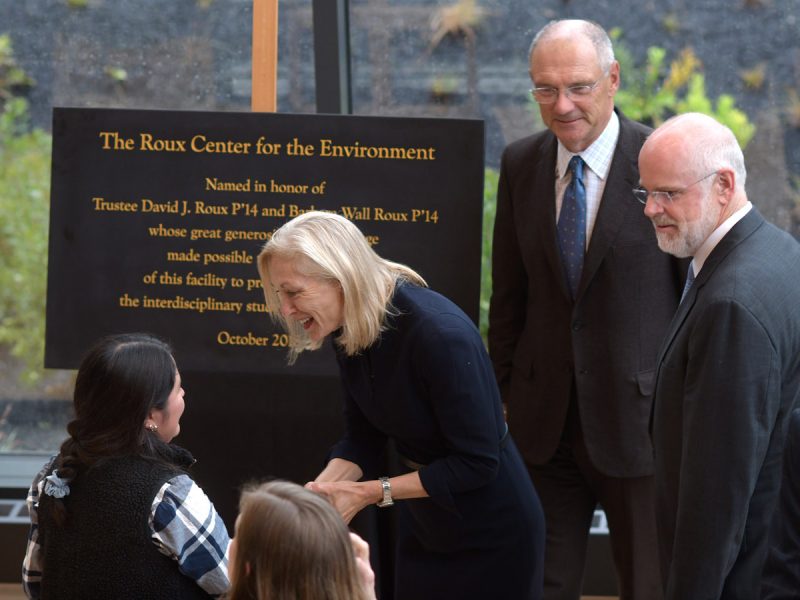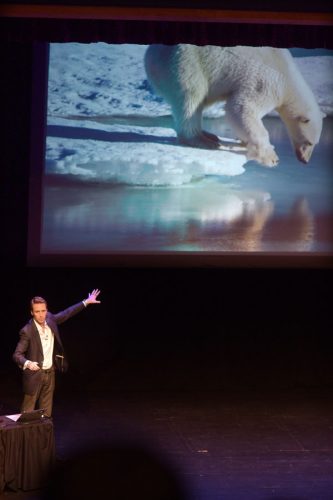Let the Problem Solving Begin: Roux Center Is Officially Open
By Tom Porter



Built to the highest standards of “green” architecture (LEED Platinum certification), the Center was funded by a lead gift of $10 million from David and Barbara Roux. It brings together faculty and students from across the College’s curriculum, fostering collaboration and creativity in the teaching and study of the environment.
Speaking at the dedication ceremony, President Rose said Bowdoin was now “incredibly well positioned” to continue doing exceptional work in this field for decades. In addition, he cited the College’s history, faculty, staff, students, and location on the coast of Maine. “Beyond our ability to have an impact in this area,” he added, “this building provides a physical and intellectual model for how the rest of the campus can think about engaging in interdisciplinary work across a raft of problems. Last but not least, it is a super cool building!”
“This is a stunning new center that will advance the critical work of educating and motivating a new generation of humanists, scientists, and social scientists to meet the world’s great environmental challenges.”
——Michele “Shelley” Cyr ’76, P’12, chair of the Bowdoin College Board of Trustees
After the dedication ceremony, guests headed to a celebration dinner at Thorne Dining Hall, where Michele “Shelley” Cyr ’76, P’12, chair of the Bowdoin College Board of Trustees, was first to speak. She described the building as “a stunning new center that will advance the critical work of educating and motivating a new generation of humanists, scientists, and social scientists to meet the world’s great environmental challenges.”
Donors David and Barbara Roux, whose generous gift initiated the project, also addressed the crowd. “Education is a team sport,” said David, a technology entrepreneur and member of the Bowdoin College Board of Trustees, “and the magic of the place is the opportunity for collaboration and sharing” among Bowdoin students, faculty, and partners from communities “far and wide.” Barbara, who breeds and trains American show jumping horses, described the occasion as “an epic day for Bowdoin and for the environment.”
To celebrate the opening of the Center, an academic symposium was held in Kresge Auditorium earlier that afternoon, titled “Understanding Our Environmental Future: Science, Policy, and Art.” The event featured a diverse set of speakers, including a panel of alumni experts. Read more about the symposium.

The day was rounded off with a keynote address by environmental advocate and filmmaker Philippe Cousteau, grandson of the legendary Jacques Cousteau. His talk, “Our Oceans: Our Future,” highlighted the extent to which the health of the world’s oceans is declining due to climate change. Not enough action is being taken, he warned, insisting that environmental advocates need to place more emphasis on the human consequences of climate change, rather than the effects it has on animals and the natural world.
“We, as storytellers and communicators, as scientists and policy-makers, I believe, need to do a better job of talking about humans and less about polar bears,” said Cousteau, who added that he does love and value polar bears (a good thing to say at Bowdoin College!) “They are critical to the ecosystem,” he said. “But polar bears, as a poster child of climate change, are not working,” he told the crowd, and the message needs to change.
“People connect to people,” he stressed—they care about feeding their families and their communities, and more of the world’s population needs to realize how much of a threat climate change is to human life. Dealing with climate change is what matters, he said, “because if we get that right, the polar bears will be OK.”
Check out some recent press coverage of the Roux Center for the Environment
- WMTM Channel 8: Bowdoin College Opens Roux Center for the Environment
- Times-Record: Bowdoin dedicates Roux Center for the Environment
- Mainebiz: Bowdoin’s new Roux Center isn’t just another academic building